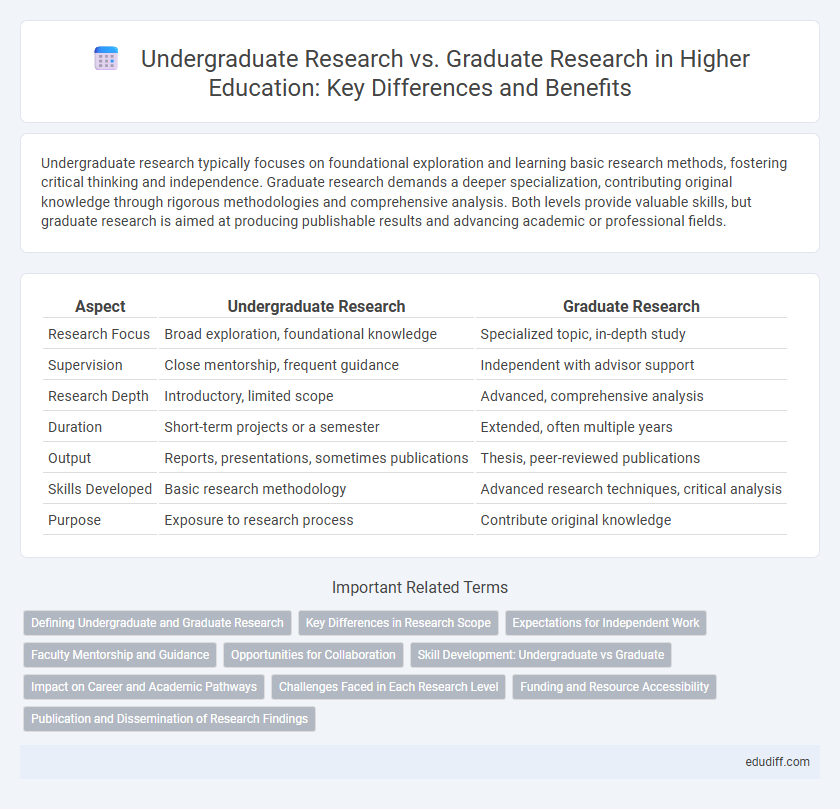Undergraduate research typically focuses on foundational exploration and learning basic research methods, fostering critical thinking and independence. Graduate research demands a deeper specialization, contributing original knowledge through rigorous methodologies and comprehensive analysis. Both levels provide valuable skills, but graduate research is aimed at producing publishable results and advancing academic or professional fields.
Table of Comparison
| Aspect | Undergraduate Research | Graduate Research |
|---|---|---|
| Research Focus | Broad exploration, foundational knowledge | Specialized topic, in-depth study |
| Supervision | Close mentorship, frequent guidance | Independent with advisor support |
| Research Depth | Introductory, limited scope | Advanced, comprehensive analysis |
| Duration | Short-term projects or a semester | Extended, often multiple years |
| Output | Reports, presentations, sometimes publications | Thesis, peer-reviewed publications |
| Skills Developed | Basic research methodology | Advanced research techniques, critical analysis |
| Purpose | Exposure to research process | Contribute original knowledge |
Defining Undergraduate and Graduate Research
Undergraduate research typically involves foundational inquiry projects designed to develop students' critical thinking and basic research methodologies within their discipline. Graduate research is characterized by advanced, original investigations that contribute new knowledge or theories to a specific field, often culminating in a thesis or dissertation. The distinction lies in the depth, scope, and expected outcomes, with graduate research demanding greater independence and specialized expertise.
Key Differences in Research Scope
Undergraduate research typically involves exploratory projects with a narrower scope, focusing on foundational knowledge and developing essential research skills. Graduate research demands a deeper and more comprehensive investigation addressing complex problems, often contributing original knowledge to the academic field. The scope of graduate research includes extensive data analysis, critical synthesis, and theoretical development beyond the preliminary findings typical of undergraduate studies.
Expectations for Independent Work
Undergraduate research typically emphasizes guided exploration with structured support, fostering foundational skills in data collection and analysis. Graduate research demands greater autonomy, expecting students to independently develop hypotheses, design methodologies, and critically evaluate findings. This transition reflects a significant escalation in the level of intellectual initiative and responsibility required for original scholarly contributions.
Faculty Mentorship and Guidance
Faculty mentorship in undergraduate research typically emphasizes foundational skills development, offering structured guidance and close supervision to nurture student independence. Graduate research mentorship centers on specialized expertise and intellectual autonomy, where faculty provide critical feedback and facilitate advanced scholarly contribution. Strong faculty involvement enhances research quality and student growth at both academic levels, adapting to the distinct developmental needs of undergraduates and graduates.
Opportunities for Collaboration
Undergraduate research often emphasizes foundational skills and provides numerous opportunities for collaborative projects with faculty and graduate students, fostering early academic networking. Graduate research typically involves more specialized, in-depth investigations, encouraging collaboration across interdisciplinary teams and external institutions to address complex problems. Both levels promote teamwork, but graduate research offers greater scope for co-authorship and access to advanced resources.
Skill Development: Undergraduate vs Graduate
Undergraduate research primarily fosters foundational skills such as critical thinking, basic data analysis, and literature review, preparing students for advanced academic work. Graduate research emphasizes specialized skills including advanced experimental design, complex data interpretation, and independent problem-solving essential for professional expertise and scholarly contribution. Both levels enhance communication and technical proficiencies, but graduate research demands a higher degree of autonomy and innovation in skill application.
Impact on Career and Academic Pathways
Undergraduate research fosters foundational skills, critical thinking, and early exposure to academic inquiry, significantly enhancing graduate school applications and entry-level job competitiveness. Graduate research drives specialization, producing original contributions to a field that open advanced career pathways in academia, industry leadership, and specialized research roles. The intensity and scope of graduate research establish a professional identity, increase publication opportunities, and build networks essential for long-term career advancement.
Challenges Faced in Each Research Level
Undergraduate research presents challenges such as limited access to advanced resources and a steep learning curve in research methodologies, often requiring close supervision. Graduate research involves tackling complex, original problems with higher expectations for independence and critical analysis, demanding extensive literature reviews and sophisticated experimental designs. Both levels face time management difficulties, but graduate students must also navigate publishing pressures and funding acquisition.
Funding and Resource Accessibility
Undergraduate research often faces limited funding opportunities and restricted access to advanced resources compared to graduate research, which benefits from dedicated grants and institutional support. Graduate students typically secure funding through scholarships, fellowships, and assistantships, enabling access to specialized laboratories and equipment. The disparity in financial backing directly influences the scope and depth of research projects at each academic level.
Publication and Dissemination of Research Findings
Undergraduate research often results in conference presentations, posters, or campus journals, prioritizing skill development and preliminary findings dissemination. Graduate research emphasizes publishing in peer-reviewed journals and presenting at national or international conferences to establish academic credibility and contribute to the broader scholarly community. The higher stakes in graduate research necessitate rigorous peer review and wider dissemination, enhancing visibility and impact within the academic field.
Undergraduate Research vs Graduate Research Infographic

 edudiff.com
edudiff.com